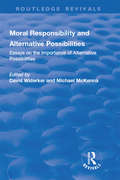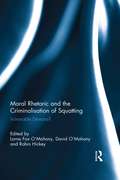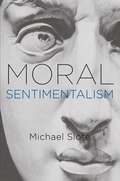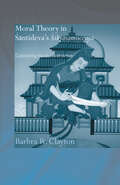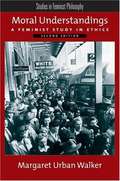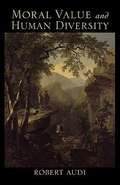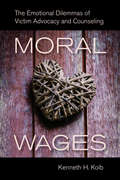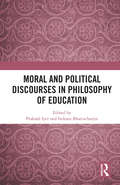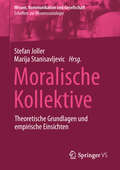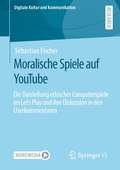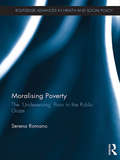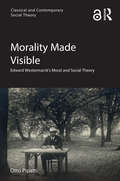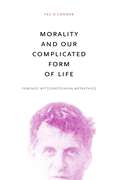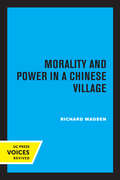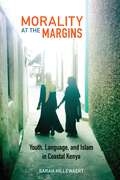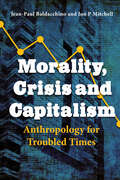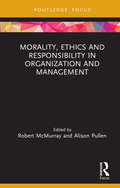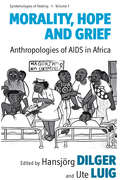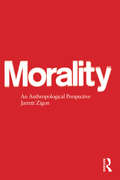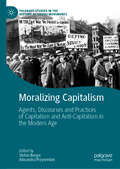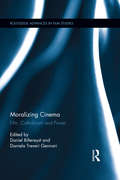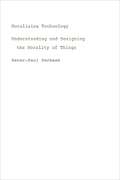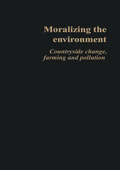- Table View
- List View
Moral Responsibility and Alternative Possibilities: Essays on the Importance of Alternative Possibilities
by David Widerker and Michael McKennaThis book was published in 2003. This book explores an important issue within the free will debate: the relation between free will and moral responsibility. In his seminal article "Alternate Possibilities and Moral Responsibility", Harry Frankfurt launched a vigorous attack on the standard conception of that relation, questioning the claim that a person is morally responsible for what she has done only if she could have done otherwise. Since then, Frankfurt's thesis has been at the center of philosophical discussions on free will and moral responsibility. "Moral Responsibility and Alternative Possibilities", edited by David Widerker and Michael McKenna, draws together the most recent work on Frankfurt's thesis by leading theorists in the area of free will and responsibility. As the majority of the essays appear here for the first time, "Moral Responsibility and Alternative Possibilities" offers the newest developments in this important debate.
Moral Rhetoric and the Criminalisation of Squatting: Vulnerable Demons?
by Lorna Fox O'Mahony David O'Mahony Robin HickeyThis collection of critical essays considers the criminalisation of squatting from a range of different theoretical, policy and practice perspectives. While the practice of squatting has long been criminalised in some jurisdictions, the last few years have witnessed the emergence of a newly constituted political concern with unlawful occupation of land. With initiatives to address the ‘threat’ of squatting sweeping across Europe, the offence of squatting in a residential building was created in England in 2012. This development, which has attracted a large measure of media attention, has been widely regarded as a controversial policy departure, with many commentators, Parliamentarians, and professional organisations arguing that its support is premised on misunderstandings of the current law and a precarious evidence-base concerning the nature and prevalence of ‘squatting’. Moral Rhetoric and the Criminalisation of Squatting explores the significance of measures to criminalise squatting for squatters, owners and communities. The book also interrogates wider themes that draw on political philosophy, social policy, criminal justice and the nature of ownership, to consider how the assimilation of squatting to a contemporary punitive turn is shaping the political, social, legal and moral landscapes of property, housing and crime.
Moral Sentimentalism
by Michael SloteThere has recently been a good deal of interest in moral sentimentalism, but most of that interest has been exclusively either in metaethical questions about the meaning of moral terms or in normative issues about benevolence and/or caring and their place in morality. In Moral SentimentalismMichael Slote attempts to deal with both sorts of issues and to do so, primarily, in terms of the notion or phenomenon of empathy. Hume sought to do something like this over two centuries ago, though he didn't have the term "empathy" and used "sympathy" instead; and in effect Slote is seeking togive moral sentimentalism a "second wind" in and for contemporary circumstances. By relying systematically on empathy in its account of normative morality and in what it has to say about the meaning of moral vocabulary, Moral Sentimentalism offers a unified overall ethical picture that can then betested against ethical rationalism. Rationalism has recently dominated the scene in ethics, but by showing how sentimentalism can make coherent and intuitive sense of such preferred rationalist notions as autonomy, respect, and justice--and by showing how a sentimentalism based in empathy can dealwith ethically significant aspects of the moral life that rationalism tends to ignore or skimp on--Slote hopes a wider and more active debate between rationalism and sentimentalism can be set in motion. There are signs that sentimentalist modes of thought are gaining new footholds on the way ethicsis done, and this new book is very hopeful about these possibilities.
Moral Status and Human Life
by James G. DwyerAre children of equal, lesser, or perhaps even greater moral importance than adults? This work of applied moral philosophy develops a comprehensive account of how adults as moral agents ascribe moral status to beings - ourselves and others - and on the basis of that account identifies multiple criteria for having moral status. It argues that proper application of those criteria should lead us to treat children as of greater moral importance than adults. This conclusion presents a basis for critiquing existing social practices, many of which implicitly presuppose that children occupy an inferior status, and for suggesting how government policy, law, and social life might be different if it reflected an assumption that children are actually of superior status.
Moral Theory in Santideva's Siksasamuccaya: Cultivating the Fruits of Virtue (Routledge Critical Studies in Buddhism)
by Barbra R. ClaytonThis important text analyzes the moral theory of the seventh century Indian Mahayana master, Santideva, author of the well-known religious poem, the Bodhicaryavatara (Entering the Path of Enlightenment) as well as the significant, but relatively overlooked, Siksasamuccaya (Compendium of Teachings). With particular focus on the Siksasamuccaya, this book uses original translations and critical analysis in order to answer the question: How would Santideva’s ethics be understood in terms of Western moral theory? Santideva’s ethical presuppositions and moral reasoning are illuminated by analyzing his key moral terms and comparing them to other Buddhist principles. By focusing on a neglected Buddhist Sanskrit text by a major Mahayana figure, Barbra R. Clayton helps to redress a significant imbalance in the scholarship on Buddhist ethics, which has - up to now - focused primarily on the ethics of the Pali literature as interpreted in the Theravada tradition.
Moral Understandings: A Feminist Study In Ethics
by Margaret Urban WalkerThis is a revised edition of Walker's well-known book in feminist ethics first published in 1997. Walker's book proposes a view of morality and an approach to ethical theory which uses the critical insights of feminism and race theory to rethink the epistemological and moral position of the ethical theorist, and how moral theory is inescapably shaped by culture and history. The main gist of her book is that morality is embodied in "practices of responsibility" that express our identities, values, and connections to others in socially patterned ways. Thus ethical theory needs to be empirically informed and politically critical to avoid reiterating forms of socially entrenched bias. Responsible ethical theory should reveal and question the moral significance of social differences. The book engages with, and challenges, the work of contemporary analytic philosophers in ethics.
Moral Value and Human Diversity
by Robert AudiAre there ethical standards that deserve everyone's allegiance? Can judgments of value transcend taste and cultural preference? Moral Value and Human Diversity offers a brief but highly comprehensive introduction to ethics and value theory that argues for positive answers in a pluralistic framework.
Moral Wages
by Kenneth H. KolbMoral Wages offers the reader a vivid depiction of what it is like to work inside an agency that assists victims of domestic violence and sexual assault. Based on over a year of fieldwork by a man in a setting many presume to be hostile to men, this ethnographic account is unlike most research on the topic of violence against women. Instead of focusing on the victims or perpetrators of abuse, Moral Wages focuses exclusively on the service providers in the middle. It shows how victim advocates and counselors--who don't enjoy extrinsic benefits like pay, power, and prestige--are sustained by a different kind of compensation. As long as they can overcome a number of workplace dilemmas, they earn a special type of emotional reward reserved for those who help others in need: moral wages. As their struggles mount, though, it becomes clear that their jobs often put them in impossible situations--requiring them to aid and feel for vulnerable clients, yet giving them few and feeble tools to combat a persistent social problem.
Moral and Political Discourses in Philosophy of Education
by Prakash Iyer Indrani BhattacharjeeThis book focuses on moral and political education and critically engages with educational issues from a philosophical perspective. It engages with questions of moral education as well as questions about citizenship education, to address apprehensions on learning in a liberal democracy while parallelly invoking issues from within the curriculum, the school environment and teacher-student relationship. With contributions from renowned philosophers and educationists, this volume discusses themes like civic education and liberal democracy; toleration and freedom; Tagore’s conception of the moral and political self; key issues in moral education; cosmopolitanism, compassion, care ethics and moral purpose of schooling; to revisit and rethink some foundational questions related to education, curriculum and pedagogy. This volume will be essential reading for educationists and educators and will be important for scholars and researchers of philosophy of education, education, teacher education and school education.
Moralische Kollektive: Theoretische Grundlagen und empirische Einsichten (Wissen, Kommunikation und Gesellschaft)
by Stefan Joller Marija StanisavljevicOb Terroranschläge, Flüchtlings- oder Finanzkrisen – die Herausforderungen der globalisierten Moderne legen jene Bereiche frei, die Durkheim als anomisch bezeichnete und deren Bearbeitung nach wie vor die zentrale Stellung moralischer Kommunikation verdeutlicht. Einiges spricht dafür, dass die fortschreitende funktionale Differenzierung die Moral nicht erodieren lässt, sondern durch die zunehmende kommunikative Vernetzung geradezu eine Remoralisierung der Gesellschaft befördert. Überall dort, wo Missstände zu Tage treten und nicht abzusehen ist, wie diese im modus operandi befriedigend gelöst werden könnten, gibt die Moral ein verheißungsvolles Instrument zur Hand, das in Gestalt moralischer Kollektive den Alltag zu durchdringen und die Gesellschaft zu formen vermag. Der Sammelband widmet sich in diesem Sinne einer sowohl theoretischen wie auch empirischen Analyse der Moral, die als genuin soziale Größe über moralische Kollektive Form annimmt.
Moralische Spiele auf YouTube: Die Darstellung ethischer Computerspiele im Let’s Play und ihre Diskussion in den Userkommentaren (Digitale Kultur und Kommunikation #10)
by Sebastian FischerModerne Computerspiele erschaffen komplexe Welten, in denen sich Spielende nicht selten gezwungen sehen, kontrovers zu handeln oder schwierige moralische Entscheidungen zu treffen. Aber Spiele werden heute nicht mehr nur aktiv rezipiert. Insbesondere auf YouTube schauen Millionen Menschen täglich Videos von ‚Let’s-Playern‘, die ihre eigenen Spielerlebnisse aufzeichnen und live kommentieren. Dabei erschließen die Videoproduzenten*innen das ethische Potential der gezeigten Spiele, indem sie deren Möglichkeitsräume erkunden und ihre subjektiven Empfindungen und Entscheidungsprozesse verbalisieren. Die Rezipient*innen greifen die Inhalte der Videos wiederum auf und diskutieren darüber in den Userkommentaren. Auf diese Weise vollzieht sich eine massenhafte Distribution und Diskussion von moralischen Ideen, die weit über den virtuellen Raum YouTubes hinaus wirkt. Sebastian Fischer beschreibt dieses Phänomen ‚moralischer Let’s-Plays‘, indem er die Darstellung einiger der populärsten ethischen Computerspiele der vergangenen Jahre analysiert. Die Arbeit liefert nicht nur eine erste Deskription dieses bislang unerforschten Themas, sondern leitet auch Schlussfolgerungen ab, die sich auf den allgemeinen Prozess moralischen Spielens übertragen lassen.
Moralising Poverty: The ‘Undeserving’ Poor in the Public Gaze
by Serena RomanoDo we judge the poor? Do we fear them? Do we have a moral obligation to help those in need? The moral and social grounds of solidarity and deservedness in relation to aid for poor people are rarely steady. This is particularly true under contemporary austerity reforms, where current debates question exactly who is most ‘deserving’ of protection in times of crisis. These arguments have accompanied a rise in the production of negative and punitive sentiments towards the poor. This book breaks new ground in the discussion of the moral dimension of poverty and its implications for the treatment of the poor in mature welfare states, drawing upon the diverse political, social and symbolic constructions of deservedness and otherness. It takes a new look at the issue of poverty from the perspective of public policy, media and public opinion. It also examines, in a topical manner, the various ways in which certain factions contribute to the production of stereotyped representations of poverty and to the construction of boundaries between ‘insiders’ and ‘outsiders’ in our society. Case studies from the UK and Italy are used to examine these issues, and to understand the impact that a moralising of poverty has on the everyday experiences of the poor. This is valuable reading for students and researchers interested in contemporary social work, social policy and welfare systems.
Morality Made Visible: Edward Westermarck’s Moral and Social Theory (Classical and Contemporary Social Theory)
by Otto PipattiWhile highly respected among evolutionary scholars, the sociologist, anthropologist and philosopher Edward Westermarck is now largely forgotten in the social sciences. This book is the first full study of his moral and social theory, focusing on the key elements of his theory of moral emotions as presented in The Origin and Development of the Moral Ideas and summarised in Ethical Relativity. Examining Westermarck’s evolutionary approach to the human mind, the author introduces important new themes to scholarship on Westermarck, including the pivotal role of emotions in human reciprocity, the evolutionary origins of human society, social solidarity, the emergence and maintenance of moral norms and moral responsibility. With attention to Westermarck’s debt to David Hume and Adam Smith, whose views on human nature, moral sentiments and sympathy Westermarck combined with Darwinian evolutionary thinking, Morality Made Visible highlights the importance of the theory of sympathy that lies at the heart of Westermarck’s work, which proves to be crucial to his understanding of morality and human social life. A rigorous examination of Westermarck’s moral and social theory in its intellectual context, this volume connects Westermarck’s work on morality to classical sociology, to the history of evolutionism in the social and behavioural sciences, and to the sociological study of morality and emotions, showing him to be the forerunner of modern evolutionary psychology and anthropology. In revealing the lasting value of his work in understanding and explaining a wide range of moral phenomena, it will appeal to scholars of sociology, anthropology and psychology with interests in social theory, morality and intellectual history.
Morality and Masculinity in the Carolingian Empire
by Rachel StoneWhat did it mean to be a Frankish nobleman in an age of reform? How could Carolingian lay nobles maintain their masculinity and their social position, while adhering to new and stricter moral demands by reformers concerning behaviour in war, sexual conduct and the correct use of power? This book explores the complex interaction between Christian moral ideals and social realities, and between religious reformers and the lay political elite they addressed. It uses the numerous texts addressed to a lay audience (including lay mirrors, secular poetry, political polemic, historical writings and legislation) to examine how Biblical and patristic moral ideas were reshaped to become compatible with the realities of noble life in the Carolingian empire. This innovative analysis of Carolingian moral norms demonstrates how gender interacted with political and religious thought to create a distinctive Frankish elite culture, presenting a new picture of early medieval masculinity.
Morality and Our Complicated Form of Life: Feminist Wittgensteinian Metaethics
by Peg O’ConnorMoral philosophy, like much of philosophy generally, has been bedeviled by an obsession with seeking secure epistemological foundations and with dichotomies between mind and body, fact and value, subjectivity and objectivity, nature and normativity. These are still alive today in the realism-versus-antirealism debates in ethics. Peg O'Connor draws inspiration from the later Wittgenstein's philosophy to sidestep these pitfalls and develop a new approach to the grounding of ethics (i.e., metaethics) that looks to the interconnected nature of social practices, most especially those that Wittgenstein called “language games.” These language games provide structure and stability to our moral lives while they permit the flexibility to accommodate change in moral understandings and attitudes. To this end, O'Connor deploys new metaphors from architecture and knitting to describe her approach as “felted stabilism,” which locates morality in a large set of overlapping and crisscrossing language games such as engaging in moral inquiry, seeking justifications for our beliefs and actions, formulating reasons for actions, making judgments, disagreeing with other people or dissenting from dominant norms, manifesting moral understandings, and taking and assigning responsibility.
Morality and Power in a Chinese Village
by Richard MadsenThis title is part of UC Press's Voices Revived program, which commemorates University of California Press’s mission to seek out and cultivate the brightest minds and give them voice, reach, and impact. Drawing on a backlist dating to 1893, Voices Revived makes high-quality, peer-reviewed scholarship accessible once again using print-on-demand technology. This title was originally published in 1984.
Morality at the Margins: Youth, Language, and Islam in Coastal Kenya
by Sarah HillewaertThis book considers the day-to-day lives of young Muslims on Kenya’s island of Lamu, who live simultaneously on the edge and in the center. At the margins of the national and international economy and of Western notions of modernity, Lamu’s inhabitants nevertheless find themselves the focus of campaigns against Islamic radicalization and of Western touristic imaginations of the untouched and secluded. What does it mean to be young, modern, and Muslim here? How are these denominators imagined and enacted in daily encounters? Documenting the everyday lives of Lamu youth, this ethnography explores how young people negotiate cultural, religious, political, and economic expectations through nuanced deployments of language, dress, and bodily comportment. Hillewaert shows how seemingly mundane practices—how young people greet others, how they walk, dress, and talk—can become tactics in the negotiation of moral personhood.Morality at the Margins traces the shifting meanings and potential ambiguities of such everyday signs—and the dangers of their misconstrual. By examining the uncertainties that underwrite projects of self-fashioning, the book highlights how shifting and scalable discourses of tradition, modernity, secularization, nationalism, and religious piety inform changing notions of moral subjectivity. In elaborating everyday practices of Islamic pluralism, the book shows the ways in which Muslim societies critically engage with change while sustaining a sense of integrity and morality.
Morality, Crisis and Capitalism: Anthropology for Troubled Times
by Jon P. Mitchell Jean-Paul Baldacchino'May you live in interesting times’ was made famous by Sir Austen Chamberlain. The premise is that ‘interesting times’ are times of upheaval, conflict and insecurity - troubled times. With the growing numbers of displaced populations and the rise in the politics of fear and hate, we are facing challenges to our very ‘species-being’. Papers in the volume include ethnographic studies on the ‘refugee crisis’, the ‘financial crisis’ and the ‘rule of law crisis' in the Mediterranean as well as the crisis of violence and hunger in South America.
Morality, Ethics and Responsibility in Organization and Management (Routledge Focus on Women Writers in Organization Studies)
by Alison Pullen Robert McMurrayIn the aftermath of the financial crisis, and regular corporate scandals, there has been a growing concern with the moral and ethical foundations of business. Often these concerns are limited to narrow accounts of governance codes, regulatory procedures or behaviour incentives, which are often characterized by neoliberal bias underpinned by western masculine logics. This book challenges these limited accounts of ethics and responsibility. It looks at the writing of Gayatri C. Spivak who takes globally networked markets, people and ideas and provides tools to rethink subjectivity, ethics and corporate governance. Eschewing strict hierarchical notions of authority and identity, Spivak’s work invites us to consider who speaks for whom and for what in organizational contexts. Relationality is also to be found in the radical politics and feminist ethics of Judith Butler who continues to draw on and develop her account of performativity to interpret contemporary organizations, management and work. While popular accounts of corporate ethics often concern themselves with the aims and actions of those at the top of organizations, Lauren Berlant focuses on the struggles of those at the bottom of the new social structures created by contemporary forms of capital. Finally, the book also considers ecological challenges through the work of Val Plumwood, who spent a lifetime considering the threats and responsibilities we face in environmental terms, and developed a feminist ecological philosophy for understanding social and species differences. This book will be relevant to students and researchers across business and management, organizational studies, critical management studies, gender studies and sociology.
Morality, Hope And Grief
by Ute Luig Hansjorg DilgerThe HIV/AIDS epidemic in sub-Saharan Africa has been addressed and perceived predominantly through the broad perspectives of social and economic theories as well as public health and development discourses. This volume however, focuses on the micro-politics of illness, treatment and death in order to offer innovative insights into the complex processes that shape individual and community responses to AIDS. The contributions describe the dilemmas that families, communities and health professionals face and shed new light on the transformation of social and moral orders in African societies, which have been increasingly marginalised in the context of global modernity.
Morality: An Anthropological Perspective
by Jarrett ZigonMorality: An Anthropological Perspective provides the first account of anthropological approaches to the question of morality. By considering how morality is viewed and enacted in different cultures, and how it is related to key social institutions such as religion, law, gender, sexuality and medical practice, Morality takes a closer look at some of the most central questions of the morality debates of our time. The book combines theory with practical case studies for student use. Drawing on anthropological, philosophical and general social scientific literature, the book will be useful for both undergraduate students and researchers. Accessibly written, Morality provides a unique and wide-ranging perspective on morality, and will be essential reading for those interested in this important contemporary debate.
Moralizing Capitalism: Agents, Discourses and Practices of Capitalism and Anti-Capitalism in the Modern Age (Palgrave Studies in the History of Social Movements)
by Stefan Berger Alexandra PrzyrembelThis book adds a crucial focus on morality to the growing literature on the history of capitalism by exploring social and cultural perspectives on the economic order that has dominated the modern world. Taking the study beyond narrow economic confines, it traces the entanglement between moral sentiments and capitalism, examining both moral critiques and moral justifications. Company bankruptcies, systems of taxation, wealth, and the running of stock exchanges were attacked on moral grounds, while ideas of economic justice and the humanization of capitalism loomed large over moral critiques. Many movements, from antislavery to labour campaigns, were inspired by aspirations to improve capitalism and halt the moral decay that was felt to have affected large sections of society. This book questions how moral sentiments are defined and have changed over time, and how these relate to both capitalism and anti-capitalism. Covering a range of different social movements and ethical issues, the 13 chapters present a moral history of capitalism, understood not simply as an economic system but as an order that encompasses all areas of modern life.
Moralizing Cinema: Film, Catholicism, and Power (Routledge Advances in Film Studies)
by Daniel Biltereyst Daniela Treveri GennariThis volume is part of the recent interest in the study of religion and popular media culture (cinema in particular), but it strongly differs from most of this work in this maturing discipline. Contrary to most other edited volumes and monographs on film and religion, Moralizing Cinema will not focus upon films (cf. the representation of biblical figures, religious themes in films, the fidelity question in movies), but rather look beyond the film text, content or aesthetics, by concentrating on the cinema-related actions, strategies and policies developed by the Catholic Church and Catholic organizations in order to influence cinema. Whereas the key role of Catholics in cinema has been well studied in the USA (cf. literature on the Legion of Decency and on the Catholic influenced Production Code Administration), the issue remains unexplored for other parts of the world. The book includes case studies on Argentina, Belgium, France, Ireland, Italy, Luxemburg, the Netherlands, and the USA.
Moralizing Technology: Understanding and Designing the Morality of Things
by Peter-Paul VerbeekTechnology permeates nearly every aspect of our daily lives. Cars enable us to travel long distances, mobile phones help us to communicate, and medical devices make it possible to detect and cure diseases. But these aids to existence are not simply neutral instruments: they give shape to what we do and how we experience the world. And because technology plays such an active role in shaping our daily actions and decisions, it is crucial, Peter-Paul Verbeek argues, that we consider the moral dimension of technology. Moralizing Technology offers exactly that: an in-depth study of the ethical dilemmas and moral issues surrounding the interaction of humans and technology. Drawing from Heidegger and Foucault, as well as from philosophers of technology such as Don Ihde and Bruno Latour, Peter-Paul Verbeek locates morality not just in the human users of technology but in the interaction between us and our machines. Verbeek cites concrete examples, including some from his own life, and compellingly argues for the morality of things. Rich and multifaceted, and sure to be controversial, Moralizing Technology will force us all to consider the virtue of new inventions and to rethink the rightness of the products we use every day.
Moralizing The Environment: Countryside change, farming and pollution
by Susanne Seymour Philip Lowe Judy Clark Neil WardFirst published in 1997. There was a time when pollution was equated with the urban and the industrial. But things have changed. What were previously mutually exclusive categories of "agriculture" and "pollution" have been brought together in a new, morally charged atmosphere. Moralizing the environment is a study of how this shift came about. It examines the emergence of the farm pollution problem in Britain in the 1980s. It draws upon a study of the regulation of farm wastes - cattle slurry, silage effluent and the dirty water from farmyards - conducted between 1989 and 1995. Detailed surveys and ethnographic fieldwork were carried out in the south-west of England among dairy farmers, pollution inspectors, agricultural advisers and environmentalists. In trying to get to grips with farm pollution they were pursuing different notions not only of sound agricultural practice but also of nature, morality and the law. What ultimately was at stake was who could be trusted to safeguard the countryside.
